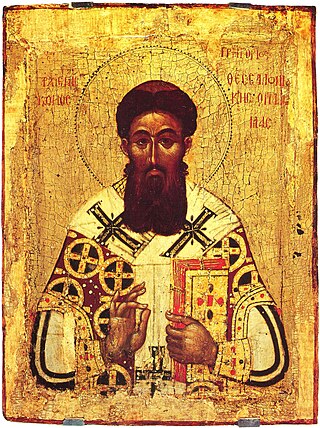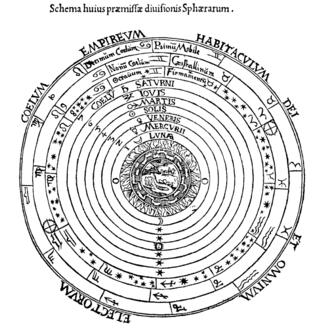
Omnipotence is the quality of having unlimited power. Monotheistic religions generally attribute omnipotence only to the deity of their faith. In the monotheistic religious philosophy of Abrahamic religions, omnipotence is often listed as one of God's characteristics, along with omniscience, omnipresence, and omnibenevolence. The presence of all these properties in a single entity has given rise to considerable theological debate, prominently including the problem of evil, the question of why such a deity would permit the existence of evil. It is accepted in philosophy and science that omnipotence can never be effectively understood.
The teleological argument is an argument for the existence of God or, more generally, that complex functionality in the natural world which looks designed is evidence of an intelligent creator.
In philosophy, rationalism is the epistemological view that "regards reason as the chief source and test of knowledge" or "any view appealing to reason as a source of knowledge or justification", often in contrast to other possible sources of knowledge such as faith, tradition, or sensory experience. More formally, rationalism is defined as a methodology or a theory "in which the criterion of truth is not sensory but intellectual and deductive".

Apophatic theology, also known as negative theology, is a form of theological thinking and religious practice which attempts to approach God, the Divine, by negation, to speak only in terms of what may not be said about the perfect goodness that is God. It forms a pair together with cataphatic theology, which approaches God or the Divine by affirmations or positive statements about what God is.

The great chain of being is a hierarchical structure of all matter and life, thought by medieval Christianity to have been decreed by God. The chain begins with God and descends through angels, humans, animals and plants to minerals.
Open theism, also known as openness theology, is a theological movement that has developed within Christianity as a rejection of the synthesis of Greek philosophy and Christian theology. It is a version of free will theism and arises out of the free will theistic tradition of the church, which goes back to the early church fathers. Open theism is typically advanced as a biblically motivated and logically consistent theology of human and divine freedom, with an emphasis on what this means for the content of God's foreknowledge and exercise of God's power.
Impassibility describes the theological doctrine that God does not experience pain or pleasure from the actions of another being. It has often been seen as a consequence of divine aseity, the idea that God is absolutely independent of any other being, i.e., in no way causally dependent. Being affected by the state or actions of another would seem to imply causal dependence.
The problem of Hell is an ethical problem in the Abrahamic religions of Christianity, Islam and Judaism, in which the existence of Hell (Jahannam) for the punishment of souls in the Afterlife is regarded as inconsistent with the notion of a just, moral, and omnipotent, omnibenevolent, omniscient supreme being. Also regarded as inconsistent with such a just being is the combination of human free will, and the divine qualities of omniscience and omnipotence, as this would mean God would determine everything that has happened and will happen in the universe—including sinful human behavior.

Meditations on First Philosophy, in which the existence of God and the immortality of the soul are demonstrated is a philosophical treatise by René Descartes first published in Latin in 1641. The French translation was published in 1647 as Méditations Métaphysiques. The title may contain a misreading by the printer, mistaking animae immortalitas for animae immaterialitas, as suspected by A. Baillet.

The Euthyphro dilemma is found in Plato's dialogue Euthyphro, in which Socrates asks Euthyphro, "Is the pious loved by the gods because it is pious, or is it pious because it is loved by the gods?" (10a)
The existence of God is a subject of debate in theology, philosophy of religion and popular culture. A wide variety of arguments for and against the existence of God or deities can be categorized as logical, empirical, metaphysical, subjective or scientific. In philosophical terms, the question of the existence of God or deities involves the disciplines of epistemology and ontology and the theory of value.
Christianity and Hellenistic philosophies experienced complex interactions during the first to the fourth centuries.

Platonism is the philosophy of Plato and philosophical systems closely derived from it, though contemporary Platonists do not necessarily accept all doctrines of Plato. Platonism had a profound effect on Western thought. In its most basic fundamentals, Platonism affirms the existence of abstract objects, which are asserted to exist in a third realm distinct from both the sensible external world and from the internal world of consciousness, and is the opposite of nominalism. This can apply to properties, types, propositions, meanings, numbers, sets, truth values, and so on. Philosophers who affirm the existence of abstract objects are sometimes called Platonists; those who deny their existence are sometimes called nominalists. The terms "Platonism" and "nominalism" also have established senses in the history of philosophy. They denote positions that have little to do with the modern notion of an abstract object.

The attributes of God are specific characteristics of God discussed in Christian theology.

Nous, or Greek νοῦς, sometimes equated to intellect or intelligence, is a concept from classical philosophy for the faculty of the human mind necessary for understanding what is true or real.

The trademark argument is an a priori argument for the existence of God developed by French philosopher and mathematician, René Descartes. The name derives from the fact that the idea of God existing in each person "is the trademark, hallmark or stamp of their divine creator".
The argument from beauty is an argument for the existence of a realm of immaterial ideas or, most commonly, for the existence of God, that roughly states that the elegance of the laws of physics or the elegant laws of mathematics is evidence of a creator deity who has arranged these things to be beautiful and not ugly.
The theory of Forms, theory of Ideas, Platonic idealism, or Platonic realism is a philosophical theory of metaphysics developed by the Classical Greek philosopher Plato. The theory suggests that the physical world is not as real or true as "Forms". According to this theory, Forms—conventionally capitalized and also commonly translated as "Ideas"—are the non-physical, timeless, absolute, and unchangeable essences of all things, of which objects and matter in the physical world are merely imitations. Plato speaks of these entities only through the characters of his dialogues who sometimes suggest that these Forms are the only objects of study that can provide knowledge. The theory itself is contested from within Plato's dialogues, and it is a general point of controversy in philosophy. Nonetheless, the theory is considered to be a classical solution to the problem of universals.
An ontological argument is a philosophical argument, made from an ontological basis, that is advanced in support of the existence of God. Such arguments tend to refer to the state of being or existing. More specifically, ontological arguments are commonly conceived a priori in regard to the organization of the universe, whereby, if such organizational structure is true, God must exist.
Inscape and instress are complementary and enigmatic concepts about individuality and uniqueness derived by the poet Gerard Manley Hopkins from the ideas of the medieval philosopher Duns Scotus. Inscape has been rendered variously as: external design, aesthetic conception, intrinsic beauty, the intrinsic form of a thing, a form perceived in nature, the individual self, the expression of the inner core of individuality, the peculiar inner nature of things and persons, expressed in form and gesture, and an essence or identity embodied in a thing. These twin concepts are what his most famous poems are about.
[Hopkins] felt that everything in the universe was characterized by what he called inscape, the distinctive design that constitutes individual identity. This identity is not static but dynamic. Each being in the universe 'selves,' that is, enacts its identity. And the human being, the most highly selved, the most individually distinctive being in the universe, recognizes the inscape of other beings in an act that Hopkins calls instress, the apprehension of an object in an intense thrust of energy toward it that enables one to realize specific distinctiveness. Ultimately, the instress of inscape leads one to Christ, for the individual identity of any object is the stamp of divine creation on it.









